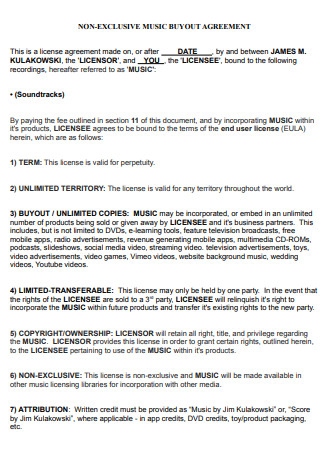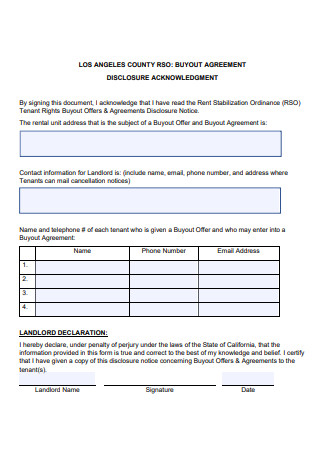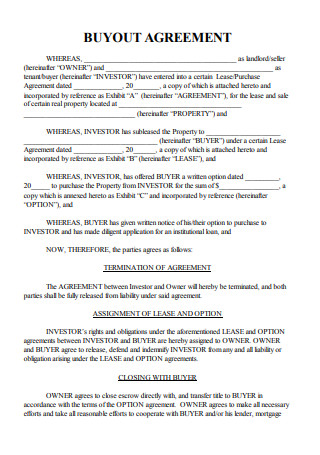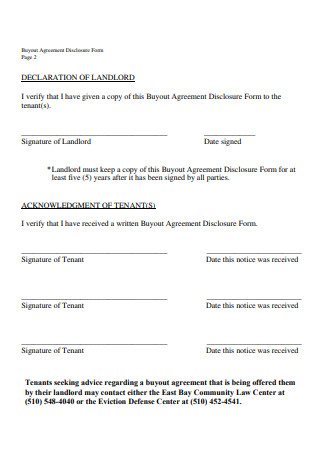3+ Sample Buyout Agreement
FREE Buyout Agreement s to Download
3+ Sample Buyout Agreement
What Is a Buyout Agreement?
What Is the Importance of the Buyout Agreement?
What Are the Reasons to Consider a Buyout Agreement?
When Is a Buyout Agreement Needed?
Types of Buyout Agreements
Common Withdrawal Events Covered in a Buyout Agreement
Elements of a Buyout Agreement
How to Write a Buyout Agreement
FAQs
When do you need a buyout in a divorce?
What is the difference between a mortgage and a buyout?
How much do you get for a company buyout?
What Is a Buyout Agreement?
A buyout agreement, also known as a buy-sell agreement, is a legally enforceable document between business partners that discusses the terms of a buyout in the event that one partner wishes to leave the company. It provides in-depth information on the partnership’s determinable value as well as information on who can purchase ownership interests in the partnership. A buyout agreement also specifies the terms under which a partner may withdraw from the business, whether a buyout of the withdrawing partner is required, and the circumstances under which a buyout may occur.
Other templates are available on our website, and you can use them whenever you need them. They are as follows: business proposal, employment contract, work contract, labor contract, business purchase agreement, partnership buyout agreement, business sale agreement, lease buyout agreement, buy-sell agreement, tenancy contract, and other similar templates are available. This post will not only provide you with templates but will also provide you with important information that you need to know in order to complete your template.
What Is the Importance of the Buyout Agreement?
If a buyout agreement is carefully prepared, it can be an extremely effective tool for safeguarding the company’s and owners’ interests in the event of a lawsuit between the parties. Nevertheless, if a buy-sell agreement is not carefully structured, it may lead to issues over the worth of the departing owner’s interest or the availability of funds to enable the firm or surviving owners to purchase that ownership interest. As a result, a well-drafted agreement should be evaluated on a regular basis to avoid concerns relating to the enforceability of old or unsuitable clauses that no longer serve the interests of the firm or the owner. Buy-sell agreements are important tools in business succession planning because they can bring numerous benefits if they are carefully prepared and/or revised to ensure that they suit the interests and objectives of all parties involved.
What Are the Reasons to Consider a Buyout Agreement?
The purchase agreement protects the surviving business partners from financial hardship or legal issues that may arise when one of the partners decides to quit the company. Businesses fail at a rate of 70 percent, making a buyout agreement all the more necessary in this situation. In the absence of such a document, the dissolution or separation of a business could result in a lengthy and expensive judicial struggle. The fact that the buyout agreement is a legally enforceable instrument that both partners agreed to when the company was created makes it a valuable asset. It should include the following elements: In order to expand their firm, a partner wishes to establish a new endeavor in a different location. Who is eligible to make an investment in the partnership’s unoccupied half. Valuations for buyouts.
The valuation of a buyout agreement is likely the most crucial part of a buyout contract. Typically, this is the source of the majority of disagreements during a buyout. It is common for businesses to be valued based on the fair market value estimated by a professional, such as an accountant, and to be valued in this manner. The fair market value of a share is determined by a number of criteria, including Loans to shareholders, Unpaid earnings, owing profits, and, in order to safeguard the remaining company partner, the buyout agreement should include restrictions on the departing business partner’s activities. Non-compete provisions are included in many buyout agreements. This prevents the departing partner from forming relationships with past clients or from establishing a similar firm within a specific geographic area or time frame after leaving the partnership. Buyout agreements may also prevent situations in which a partner exits only for the purpose of gaining financial gain.
When Is a Buyout Agreement Needed?
The use of a buyout agreement, also known as a buy-sell agreement, makes sense when you want to prohibit other members of your company from selling their ownership position to a third party. You want to make sure that if the firm’s owners become handicapped or die, their interests in the company are sold to a third party. When a member retires, gets incapacitated, or dies, you want to make it a requirement for the other members to purchase the individual’s ownership interests. You want to determine a reasonable price for the firm in order to avoid arguments when one person wishes to leave the company while the other members wish to stay on board. Also prohibited from selling his or her interest in a buyout agreement is the sale of a member’s interest to a person or company with whom the remaining members do not wish to do business. Aside from being helpful in and of itself, the process of establishing the agreement encourages open dialogue among members about your expectations and ambitions for the future of the company.
Types of Buyout Agreements
This agreement outlines the succession plan for a co-owned company in the event that one of the owners departs, retires, or passes away. This document contains provisions that will take effect in the following situations:
1. Purchase Agreement for a Vehicle or a Car
The vehicle identification number is the most important piece of information in a car/vehicle buyout agreement (VIN). The vehicle identification number (VIN) is used by the automotive industry to identify each type of vehicle. In addition, it requests information on the model, make, color, and year of manufacturing. When purchasing used vehicles, the amount of miles driven is required.
2. Agreement for the Purchase and Sale of Real Estate
A real estate buyout agreement is a legal arrangement that deals with real property such as business spaces, residential properties, and undeveloped land. The majority of real estate transactions need an earnest money deposit, which serves as a security deposit to satisfy the seller that the purchaser is serious about purchasing the property.
Common Withdrawal Events Covered in a Buyout Agreement
Many common situations, as well as unusual occurrences, can cause a partner to decide to leave their partnership and walk away from the company. In the buyout agreement, it should be stated that any probable incident will be covered. Among the events that necessitate the use of a buyout agreement are:
Elements of a Buyout Agreement
You should convene a meeting of all members to draft a buyout agreement if a member is considering leaving and you do not currently have one in place. In advance of the meeting, distribute a written agenda that details the topics to be discussed, including how the value of a member’s stake in question will be determined, whether other members or a third party will purchase the percentage, and the terms under which it will be purchased, among others. You may want to look at a sample buyout agreement to be sure you’re covering all of your bases before proceeding. The following components should be included in a buyout agreement:
How to Write a Buyout Agreement
The buy-sell or buyout agreement outlines the procedure for purchasing out a leaving member prior to the event taking place. The purchase agreement is signed at the time of the buyout and serves as a legal document outlining all of the details of the transaction in question. It must be consistent with the provisions of the operating agreement if one is included, as well as the buyout agreement. It is possible that you will want to include additional provisions. You can protect your company by incorporating a non-compete, non-disclosure, or confidentiality clause into your contract. There are a few processes involved in putting together such a contract:
Step 1: Start with the Fundamentals
It comprises stating the aim of the agreement, identifying the product or property, introducing the persons involved, and so on.
Step 2: Real Estate/Vehicle/Property Should be Defined
The specifics of the property for sale, including its condition and inclusions, should be described in depth.
Step 3: Complete the Payment Agreement
It identifies the preferred method of making a payment. It is also important to mention how the buyer intends to pay.
Step 4: Dispute Resolution & Conflict Termination
It is concerned with a list of provisions pertaining to the resolution of disputes and the termination of the agreement.
Step 5: Consult with an attorney
It is possible that you will need to obtain legal guidance from an attorney or state law.
If a buyout agreement is not already in place and the members are unable to come to an agreement during the negotiation process, a costly lawsuit may be filed against the organization. Rather than buying out a single member, it may be more cost-effective to dissolve the company and liquidate its assets in order to settle obligations and distribute the remaining assets rather than buy out the entire firm.
FAQs
When do you need a buyout in a divorce?
Divorce, in some cases, a partner’s ex-spouse receives all or part of the partnership. An ex-spouse or other partner could try to buy out the partner’s interest in the business.
What is the difference between a mortgage and a buyout?
Buyouts are payments made when someone can no longer meet their obligations. And mortgage buyouts are similar but for houses.
How much do you get for a company buyout?
Buyouts range from four weeks’ salary plus an additional week for every year worked to elaborate severance packages offered by some automakers to salaried and union employees.
Agreements are essential in business because the formality and authenticity of a document provide a sense of confidence. Negotiations must be brought to a close by putting everything down on paper and getting everyone’s signature on it. The same may be said for mortgage buyouts, which are extremely important transactions. The issue of property ownership is at stake, and it is not a simple subject to resolving. And preventing conflicts is one of the most important reasons why paperwork is required in order to ensure that a person’s fundamental rights are respected. As a result, contract agreements are the gold standard in mortgage buyouts. All parties want the transaction to be complete and devoid of ambiguity, which is why signing the agreement with ink on the dotted line is the best course of action.




